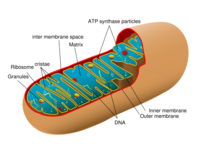Spicy Foods as Cancer Killers

Several news services have picked up a very important piece of research in the February 16th issue of the journal Biochemical and Biophysical Research Communications.
In a nutshell, they have shown that capsaicin, an ingredient of jalapeno peppers, triggers cancer cell death by attacking mitochondria, the energy producing organelles in the cell. Some of the reports were a little confused and confusing and also missed out some critical pieces.
So first, a bit of revision, this is a graphical representation of what a mitochondrion looks like:

The mitochondrion is the primary producer of energy in the cell, converting molecules derived from food or stores into adenosine triphosphate (ATP) and several other less important molecules. ATP is the energy “currency” throughout the body. In recent years we have discovered that there are a number of diseases that are a result of faulty mitochondrial metabolism.
One of the biggest problems about most forms of chemotherapy for cancer is that the treatments often damage normal cells as well as the malignant ones. Therefore a great deal of research has aimed at identifying differences between normal and malignant cells.
Over the last ten years, increasing evidence has shown that mitochondrial dysfunction is a key feature of many types of cancer as well as part of normal aging. This has lead to the idea that we might have a new therapeutic target if cancer cell mitochondria are different from those in normal cells.
This new study showed that the family of molecules to which capsaicin belongs, the vanilloids, bind to proteins in the cancer cell mitochondria to trigger apoptosis – programmed cell death – without harming surrounding healthy cells. Capsaicin was tested on cultures of human lung and pancreatic cancer cells.
As the lead researcher Timothy Bates has said, “We believe that we have in effect discovered a fundamental ‘Achilles heel‘ for all cancers.”
This is extraordinarily interesting, not least because capsaicin is already in use for the topical treatment of peripheral neuropathy and some inflammatory conditions of the skin including psoriasis. The amount of capsaicin used in the experiments was similar to amounts that could probably be ingested safely. So now the next step if to see whether these observations can be translated into a viable treatment option for cancer, and if so, which types.
What the research does not say is that eating a lot of spicy food will help prevent or treat cancer.
The reports that I have seen have failed to mention that one of the reasons for doing this research was that some spices have been used in traditional Chinese and Indian medicine for many centuries for the treatment of several conditions, and some of the investigators are engaged in the Nottingham UK–China Collaboration on Complementary and Alternative Medicine.
How many more treasures are waiting for us in the archives of traditional medicine?
And how many have already been lost as plant and animal species become extinct?







Interesting! It reminds me of the discovery of the use of Wormwood for Malaria, and now possibly Cancer. I think that it would b foolhardy to dismiss the observations that were obtained by these ‘traditional’ approaches. Seeing that they would have at least had to remain consistent for a number of years.
http://uwnews.washington.edu/ni/article.asp?articleID=2727
http://www.ncbi.nlm.nih.gov/entrez/query.fcgi?db=pubmed&cmd=Retrieve&dopt=AbstractPlus&list_uids=16185154&query_hl=13&itool=pubmed_docsum
Dear Glen,
This is a very good point. There are a surprising number of plant-derived medicines that have already been isolated. It is also one of the reasons for our concern about the disappearance of plant and animal species that may be able to help us. Though sometimes it seems as if it is the combination of chemicals in a plant that exerts the therapeutic effect, rather than a single isolate.
There is a good example that I heard about at first hand. The father of a friend of mine was working as a doctor in India when he heard that the Ayurvedic physicians were using extracts of a small bush to help “excess internal heat,” the symptoms of which were elevations of blood pressure and elevated mood. The bush was Rauwolfia serpentina. Leaves, berries and roots from the bush were sent to Edinburgh University that was one of places where reserpine – an old treatment for hypertension and some forms of mental illness – was synthesized.
Kind regards,
RP